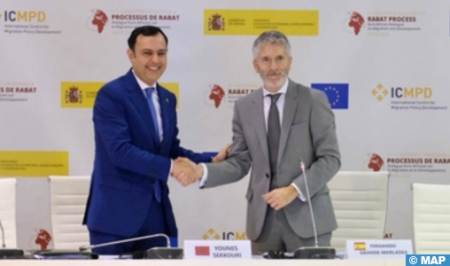Migration and Development: Morocco Assumes Presidency of “Rabat Process”
Morocco took on Wednesday the rotating Presidency of the Euro-African Dialogue on Migration and Development, “Rabat Process”, for a one-year term. During a handover ceremony, held in Cadiz on the occasion of the 6th Ministerial Conference of the “Rabat Process”, the Spanish Minister of the Interior, Fernando Grande-Marlaska, handed over the Presidency to the Minister of Economic Inclusion, Small Business, Employment and Skills, Younes Sekkouri, wishing him “every success”. The Rabat Process must be supported and strengthened, because the reasons for its creation remain valid,” said Grande-Marlaska, adding that “the issue of migration must be addressed on the basis of a comprehensive and balanced vision taking into account all the elements that surround it.” The only way to deal with the global phenomenon of migration is “two-way cooperation based on shared responsibility, mutual trust and daily operational work,” the Spanish minister noted. The Rabat Process has become a “pillar of reference” in the field of migration in the world and “we must ensure that in the months and years to come, we can develop innovative actions that take into account the challenges of all partners,” said Sekkouri. “As the Moroccan presidency, we will work to consolidate the dialogue and deepen the analysis of development dynamics that are related to migration,” he added, noting that “this is a pillar of the proactive policy that we want to deploy. “We are also working on deconstructing negative stereotypes related to migration that are detrimental to the policies that our countries want to implement,” the Minister noted. According to him, Morocco’s approach will also focus on “improving the quality of data we have on migration in the Euro-African area,” he said, calling, in this sense, to work with all Member States for the networking and development of observatories that work on migration. “We also want to ensure that the diaspora plays an important role for both countries of destination and origin to encourage research and development work in this area,” concluded Sekkouri.

